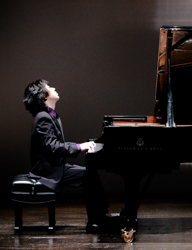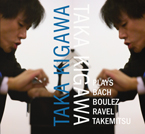- Biography
- Repertoire
- Discography
- Reviews
- Itinerary
- Media

The critically acclaimed pianist TAKA KIGAWA has earned outstanding international recognition as a concerto soloist, recitalist and chamber music artist, performing extensively in New York City, Boston, Cleveland, Washington, DC, Barcelona, Milan, Paris and Buenos Aires, in Ireland, as well as throughout his native Japan, including the cities of Tokyo, Kyoto, Nagano and Osaka. He has also been a featured artist on television and radio networks in the United States, Europe and Asia. Taka’s current season is bookended by his 23rd and 24th performances at New York City’s legendary (le) poisson rouge, this time presenting, in September, the complete solo piano works of Pierre Boulez in commemoration of the centennial of the composer’s birth, followed by an August program of Debussy’s Préludes, Books I & II.
Taka Kigawa was awarded First Prize from the prestigious 1990 Japan Music Foundation Piano Competition in Tokyo and the Diploma Prize from Spain’s 1998 Concurs Internacional de Música Maria Canals Barcelona. His 2010 New York City recital was chosen by The New York Times as one of the best concerts of the year, while a subsequent 2011 recital was selected as one of the most notable concerts of the season by Musical America. His 2014 recital in Buenos Aires was named one of the best concerts of the year by Argentina’s leading newspaper, La Nación.
Possessing an extremely large and varied repertoire, ranging from the Baroque to the avant-garde, Taka Kigawa has collaborated closely with Pierre Boulez, Myung-Whun Chung and Jonathan Nott. He premiered the last solo piano work of jazz legend Yusef Lateef in New York City in 2013.
Taka Kigawa grew up in Nagano, Japan, where he began piano studies at the age of three, and won his first competition at the age of seven. He earned his Bachelor of Arts degree from Shinsyu University and his Master of Arts degree from Tokyo Gakugei (Liberal Arts) University, graduating with honors in Piano Performance. During both his undergraduate and graduate years, Mr. Kigawa also studied composition and conducting, receiving high honors in both disciplines. He furthered his studies in the United States at The Juilliard School in New York City, where he was awarded a Master of Music degree.
Taka Kigawa is a Steinway Artist and resides in New York City.
BARTÓK
Concerto #1 (1926)
Concerto #2 (1930-31)
Concerto #3 (1945)
BEETHOVEN
Concerto #1 in C, Op. 15
Concerto #2 in B-flat, Op. 19
Concerto #3 in c, Op. 37
Concerto #4 in G, Op. 58
Concerto #5 in E-flat, Op. 73 ("Emperor")
BRAHMS
Concerto #1 in d, Op. 15
Concerto #2 in B-flat, Op. 83
CARTER
Concerto (1964-65)
FURRER, B.
Concerto (2007)
GERSHWIN
Concerto in F
Rhapsody in Blue
GRIEG
Concerto in a, Op. 16
HAYDN
Concerto in D
LIGETI
Concerto (1985-88
MOZART
Concerto #9 in E-flat, K. 271
Concerto #20 in d, K. 466
Concerto #23 in A, K. 488
Concerto #25 in C, K. 503
Concerto #27 in B-flat, K. 595
RAVEL
Concerto in D for the Left Hand
Concerto in G
SCHOENBERG
Concerto, Op. 42 (1942)
SCHUMANN
Concerto in a, Op. 54
SCRIABIN
Concerto in f-sharp, Op. 20
STRAVINSKY
Capriccio
Concerto for Piano & Wind Instruments
Movements
 |
"TAKA KIGAWA" J.S. BACH: The Art of Fugue, BWV 1080 (selections) (private label) |
Boulez From Memory For the Challenge and the Art [headline]
Pierre Boulez’s Third Piano Sonata is a work of immense visual appeal and curiosity. One movement has staves printed in red and green, straddling huge sheets of cream paper in permutable networks. The other is ring-bound, so that its four sections can be played in different orders. Taka Kigawa played the whole thing from memory, eliciting astonishment. Mr Kigawa’s feat deserves the highest praise, especially since it was combined with such alacrity and sensitivity to the musical material. Mr. Kigawa was also expert in achieving the pedal resonances, in producing variety of color and in creating sudden shafts of expressive power.
THE NEW YORK TIMES
I have heard Mr. Taka Kigawa play my piano works and I was very much impressed by the brilliant way he performed them. He was precise, and at the same time inventive. I can highly recommend Mr. Kigawa to any organization and wish him all the very best for his career.
PIERRE BOULEZ
Kigawa finds an expressive poise within the knotty chill of Boulez [headline]
Early September in New York City means pianist Taka Kigawa strides into the stage of (le) poisson rouge and plays some of the most demanding of modernist classical music. This year Kigawa played the complete solo piano music of Pierre Boulez. This was the most impressive of Kigawa’s concerts in recent years. It is one thing to play the fascinating, evocative Etudes of Pascal Dusapin and the mysterious, thrilling work of Stockhausen–quite another to play the dense, at times clumsy, and often stone-faced Boulez. Playing the three Piano Sonatas and the shorter works Incises, Douze Notations and Une page d’éphéméride, Kigawa was expressive in a way one has not heard before in this music. He played everything with a searching, lyrical touch. His articulation was careful, clear, and varied, even in rapid and complex passages, and that reflected thinking that was equally considered, thorough, and certain. Presenting Boulez at his best, Kigawa was at his very best as an interpreter.
NEW YORK CLASSICAL REVIEW
Taka Kigawa is a pianist who not only has technique to burn but possesses an uncommon intelligence. Special note to all 21st century composers: Taka Kigawa is the pianist you have been looking for.”
NEW YORK CONCERT REVIEW
Kigawa’s playing was impressive - it had to be - but as extraordinary as it was to watch his fingers dance across the rapid, complex passages, the delicacy of his playing was even more striking. In quiet moments, he summoned the merest ghosts of notes, tiny pinpricks just a half-step above silence.
THE JOURNAL OF MUSIC (Ireland)
Standing Ovation for Taka Kigawa [headline]
The Japanese pianist offered a program of Debussy, Liszt and Chopin, with a terrific mix of the elegant and the sublime. While some pianists value this sonata [Liszt] for its showy virtuosic potential, Mr. Kigawa brought real expressive depth to this massive work. With encores by Chopin and Debussy, Mr. Kigawa received a standing ovation and demands from the audience for a return engagement.
SHELTER ISLAND REPORTER (NY)
Boulez, Under the Magnifying Glass [headline]
The extraordinary Japanese pianist, who last year dazzled with Elliott Carter’s complete piano works, did not follow a chronological order, but opted instead for the opposite perspective - from most recent to earliest. Kigawa, whose rhythmic sensibility is truly astonishing, proved to be a real master in revealing recurrences, highlighting the reflections and exposing the hidden subtleties.
LA NACIÓN (Buenos Aires, Argentina)
From Taka Kigawa, a Class on Resonance at Le Poisson Rouge [headline]
The works on Mr. Kigawa’s syllabus – the two books of Debussy’s Images, Tristan Murail’s Territoires de l’Oubli and Marco Stroppa’s Traiettoria...Deviata – were far more similar than they were different. In Mr. Kigawa’s hands, they were investigations of the lives and deaths of sounds. As he moved through the program, you became increasingly sensitive to just how much of what you hear from a piano is a mysterious interplay of tones, sometimes long after the keys have been struck. Mr. Kigawa plays with a fundamental gentleness, even in intense passages, but he brings a precision to the relentless pricks and bristling repetitions in these pieces.
THE NEW YORK TIMES
Ligeti Etudes Ignite Under Taka Kigawa’s Fingers [headline]
Kigawa blazed through the 18 pieces in less than 90 minutes, taking only a short pause between each book, possibly to give the audience a breather more so than himself. The leanness of the presentation, the quality of the music, and the laser-like focus of the program combined for an awe-inspiring performance.
SAN FRANCISCO CLASSICAL VOICE
Ray of Light [headline]
Each part of Olivier Messiaen’s kaleidoscopic Catalogue d’Oiseaux (“Catalog of Birds”), which the pianist Taka Kigawa performed with preternatural ease over more than three hours, comes with a prose introduction. The text, while helpful for curious listeners, also provides clues for musicians to interpret 77 bird calls and evocations of nature. The paragraph that precedes “Le loriot” (“The oriole”) contains references to light and rainbows, and ends with the sun ‘spreading golden rays of the oriole’s song,’ rendered through rich chords that penetrate flittering transcriptions of bird song. In an interview before the performance, Mr. Kigawa said that his take on “Catalogue” is longer than others because he tries to take “a lot of space and silence.” These chords were one such instance: Already majestic, they became almost holy in his hands.
THE NEW YORK TIMES
I could not have asked for a better pianist, artist and collaborator! Taka was exceptionally warm and gracious with our musicians, and his interpretation of Ravel’s Piano Concerto in G was at times filled with fire and at other times pure poetry. Here is an artist who - while increasingly known for his interpretations of composers of the 20th and 21st centuries - is capable of playing EVERYTHING, and performing it with insight and a depth of understanding that is rare.
ELLIOT MOORE, MUSIC DIRECTOR
LONGMONT SYMPHONY ORCHESTRA (Colorado)
Classical music is a formal music, and the repertoire is packed with works that are based on a structural plan or with a specific purpose. That also means that creative subversion of forms is important in keeping long standing ideas vital. Pianist Taka Kigawa gave a stellar display of this subversion at (le) poisson rouge, when he played the seven Etudes by Pascal Dusapin.
Kigawa has always impressed with his hands and mind, exceeding in music, like Boulez’ Piano Sonatas and John Cage’s Etudes Australes, which is not just hard to get the hands around but to play with a conception that the audience can hear. Dusapin’s Etudes, with a foundation in tonal harmony and statements with clear beginnings and conclusions, have a mysterious sound, atmospheric but not foggy.
From the first Etude, Kigawa drew in the listener with these small, clear changes, all within both the overall flow of the music and the sound of the piano—each change in articulation produced a small, intriguing change in the decay from the instrument. It is these details that make these Etudes so fine. Kigawa began Etude No. 7 while the sound from No. 6 was still decaying—he played inside the one that had just passed. Then, at the end, he produce a magical effect of letting the atmosphere he had conjured disappear, delivering the final page with a kind of warm dryness, like wrapping up a dream with the first moments of waking.
New York Classical Review
6/12/2025 (5pm) |
STEINWAY & SONS OSAKA (Japan) Boulez: Douze Notations |
6/13/2025 (8pm) |
CAFÉ MONTAGE (Kyoto, Japan) Speaking event about Pierre Boulez and his works |
6/14/2025 (6pm) |
CAFÉ MONTAGE (Kyoto, Japan) Boulez: complete solo piano works |
6/27/2025 (5pm) |
STEINWAY & SONS TOKYO (Japan) Boulez: Douze Notations |
8/2/2025 (2&4pm) |
BARGEMUSIC (Brooklyn, NY) Brooklyn Bridge Park Boathouse Beethoven: Piano Sonata #17 |
| 8/3/2025 (2&4pm) | BARGEMUSIC (Brooklyn, NY) Brooklyn Bridge Park Boathouse Schumann: Études symphoniques |
| 9/7/2025 (7pm) | (LE) POISSON ROUGE (NYC) Boulez: complete solo piano works |
| 10/25/2025 (8pm) | DUPRASS PRODUCTIONS W. B. Thomson Mansion (Yonkers, NY) “The Surrealist Ball” |
| 5/6/2026 (8pm) | FORTISSIMO 2026 Zürcher Gallery (NYC) Ligeti: Études (6) |
| 5/16/2026 (6pm) | HAMMOND MUSEUM & JAPANESE STROLL GARDEN (North Salem, NY) |
| 8/29/2026 (8pm) | (LE) POISSON ROUGE (NYC) Debussy: Préludes, Books I & II |
